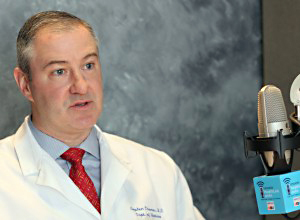April 20, 2020

Infectious disease experts live by the medical version of the mantra, “Prepare for the worst; hope for the best.” While they spend their careers studying and helping plan for outbreaks, epidemics and pandemics of serious and potentially fatal diseases—and they know they likely will be called upon to help quell such an event at least once in their career—they also hope they never see the worst-case scenario.
Right now, infectious-disease specialists are seeing something they all knew was possible, but never thought would happen at this scale in the United States: a rapidly spreading and highly contagious global viral illness, with a mortality rate worse than originally thought.
Upstate Medical University Chapter member Stephen Thomas is a professor of medicine and chief of the hospital’s infectious diseases division. A national recognized expert in his field, he has been interviewed by numerous news outlets on the coronavirus pandemic.
A graduate of Albany Medical College, Thomas did his residency at Walter Reed Army Medical Center and served in a number of medical advisory positions for the Army, including on the staff of the U.S. Army Medical Research and Material Command during the 2014 outbreak of Ebola. In that position, his responsibilities included helping with Ebola preparedness in the United States.
A UUP member since 2018, Thomas recently responded to questions from The Voice .
What is the single thing your hospital most needs right now?
Reliable supply chain of PPE [personal protective equipment.]
How would it improve or change the situation at the hospital right now if you could get FDA approval to do on-site testing?
Being able to make the diagnosis or rule out the COVID diagnosis allows us to reduce risk to staff, save PPE, properly disposition the patient in the hospital, i.e., which floor do they go to? It also has considerable public health ramifications in terms of the timely conduct of isolation and contact tracing.
In your career as an infectious disease expert, did you—or your colleagues generally in the field—think that this kind of pandemic could someday spread to the United States?
Did we think the country was vulnerable? Yes. At this scale? Not really. The worst case was always envisioned as a respiratory pathogen which spread efficiently from person to person and had a significant mortality rate; this is our situation.

